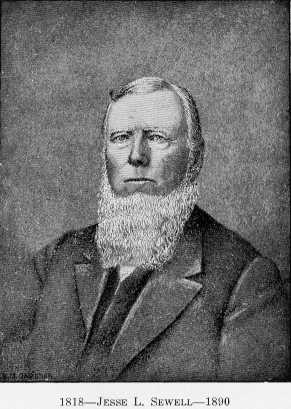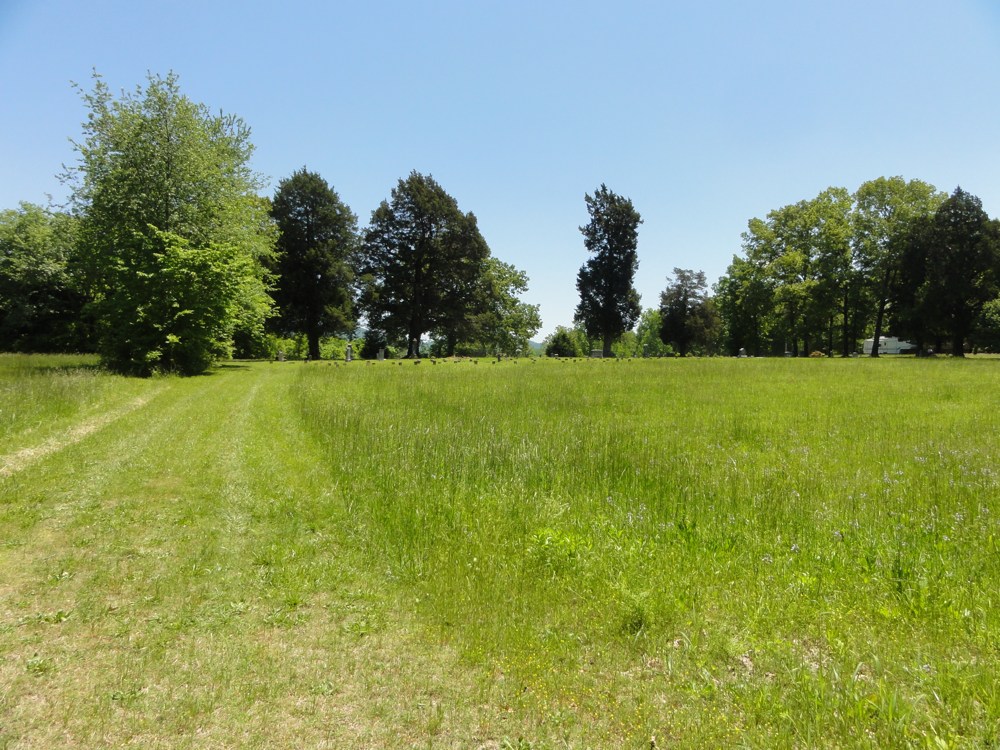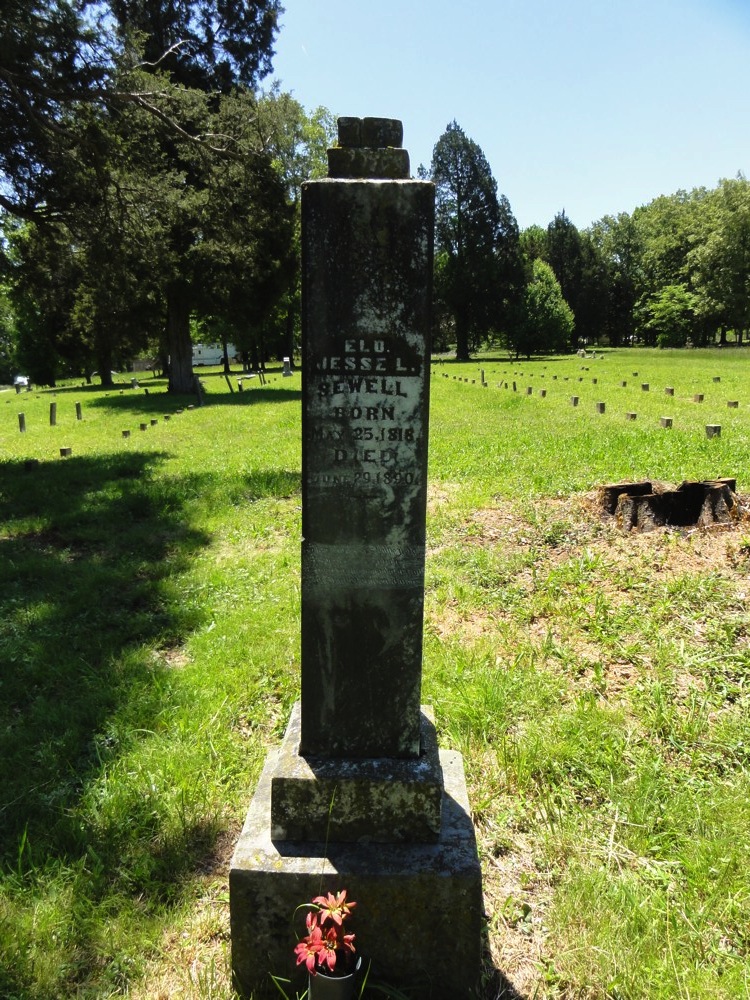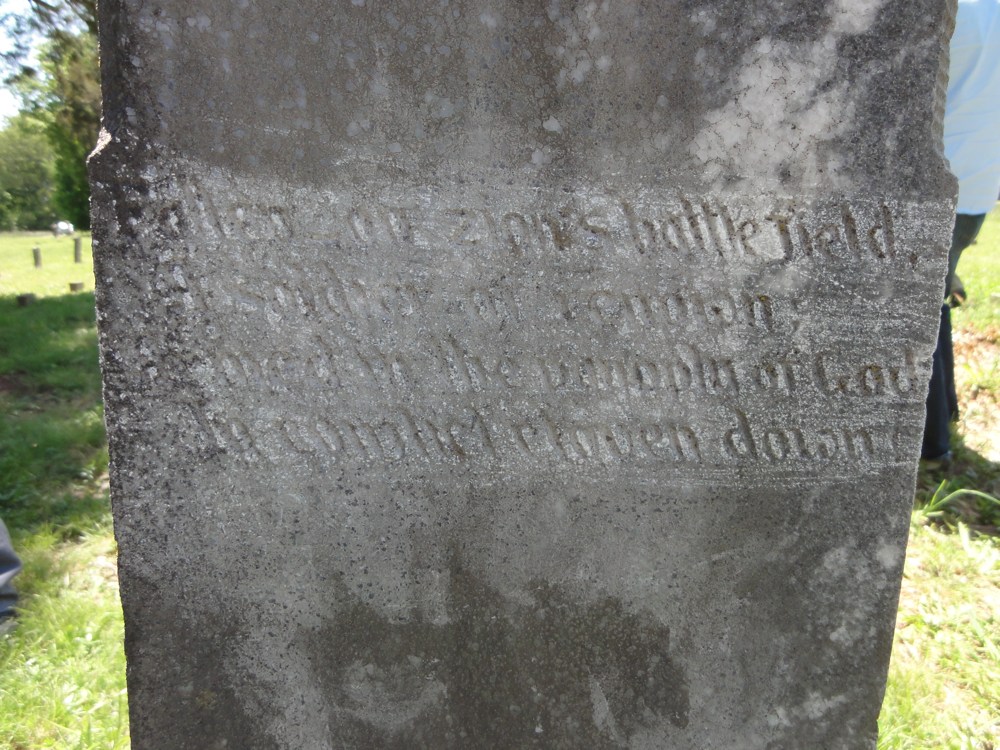Jesse Londerman Sewell
1818-1890
Biographical Sketch on the Life Of Jesse L. Sewell
From the lectures this week, one might get the idea that we are exalting some men above others. I can't see anything wrong about that. God is the creator of us all. Well, it so happens that he makes some folks much larger than some other folks. He gives some people intelligence far superior to the intelligence that he gives to some other people. He just makes some folks bigger than others, and he holds them responsible for the way they use that superior ability. Christ clearly teaches this lesson in the parable of the talents (Matthew 25:15-30). Why shouldn't we gather from these men the good lessons that are to be found and why should we not follow their examples?
In this age we are liable to overlook those who spread the religious principles which lie at the foundation of our intellectual and material advancement.
I am going to read in this connection a sentence or two from Brother David Lipscomb's book, The Life and Sermons of Jesse L. Sewell. They were written by Brother Lipscomb I am sure to keep people from thinking he was giving undue credit to a man. He said, "It is well that a remembrance of those who have labored for the good of others, who have benefited their fellow men and who have left the world better for having lived in it should be cherished. It is good to show an appreciation for those who have unselfishly devoted their lives to the salvation of men and to the service of God and to hold them up as examples worthy of the admiration of the aged and the emulation and imitation of the young."1 [1 Footnote: David Lipscomb, The Life and ,Sermons of Jesse L. Sewell, p. 5.]
I am sure that it is in that spirit and for that purpose that all of us are bringing to your attention any of the great men connected with the restoration movement.
I will present only a few incidents that I know personally or that I have received from direct testimony that could not be questioned. You will pardon me if I relate a few things from the life of Jesse L. Sewell, my grandfather.
Jesse L. Sewell was never connected with a paper; he never at any time was connected with any center of influence, and on that account he is not as well known, and his life and wonderful achievements are not as familiar to you as are those of men who were connected with the more public services. With reference to him, Brother Lipscomb wrote, "No trait of Jesse L. Sewell was more striking, even down to old age, than his reverence for the word of God, his quiet yet unyielding determination to be true and faithful to that word, to believe and teach just what it taught, and to follow just where it led, and to bear with cheerfulness whatever lot fidelity to that truth imposed upon him."2 [2 Footnote: Ibid., p. 87.]
My most cherished memory of my grandfather is the picture of him as an old man, after the vigor of manhood had passed, after long years of hard work and continuous service had taken severe toll of his physical strength, as he sat at his little table in his room by day and by night, and his big Bible open, reading from the word of God. People would sometimes say to him, "Brother Sewell, since you know the Bible so well, since you are so familiar with it, why is it that you continue to read and study it day in and day out?" His answer was like this: "I never read this Book that I do not get something' good, something fine that I had never seen in it before." And he would say, "To my mind that is the outstanding difference between this Book and all other books.
Here in my book case I have a number of very fine books that have been written by men, but when I have read them a time or two, then the next time I read them I get little or nothing. But during all of my life, from my childhood to this day, I have been reading the Bible earnestly, and attentively, each day, and still I find something fine, something good in it that I have never seen before." This was from a man who knew the New Testament from memory.
I have seen my grandfather submit to this kind of test. You could read any verse in the New Testament that you cared to read, and he would give you the chapter and verse, and quote the verse before and the verse following it. He never missed. He could go for hours like that. In the Old Testament he would not always be able to give the verse, but practically never would he fail to locate it in the chapter where it belonged. Yet with that knowledge of the word of God and his wonderful comprehension of it, he found that every time he re-read it, he always received something new and fine and good. That was an outstanding characteristic of Jesse L. Sewell.
As a preacher Jesse L. Sewell had studied just one book, and as the result of his understanding and knowledge of that book, he was able to defend and teach its truth, and its spirit under any condition or circumstance which might present itself. Brother Lipscomb relates this incident.
When Dr. Brents and Dr. Ditzler first met in debate at Flat Creek, Tennessee, Dr. Brents was sick the morning before the debate was to begin. The question with him and his friends was whether it would do for him to enter the debate in his condition of health, and if not, what should be done. Brother Lipscomb said they talked it over, all the preachers that were congregated there for the debate, discussed it, and prayed over it, and decided that if they didn't have the debate on the grounds that Dr. rents was sick, then they would be accused of being afraid. But if the debate was to be held they were compelled to ask somebody to meet the. great Dr. Ditzler without any special preparation. (And he was great. He was a scholar, a man of unusual intellect, broad culture and training and a great debater.) They looked among themselves and chose Jesse L. Sewell. Dr. Brents by the next morning was able to go into the debate and Brother Sewell did not have that work to do. I mention this incident to show the confidence that the preachers of that section and that time, many of them highly educated, had in this man of "One-Book."
Overton County, Tennessee, is far away from the highways of men. It is still an isolated county. In 1818 there was no method of approach to it except by private conveyance, walking or on the mail hack that went there twice a week. These people were separated from the outside world. Generally speaking, they were poor people, and had none of the advantages and opportunities of the outside world.
My grandfather grew up in that country and his formal education was about a third or fourth grade education as our public schools are organized today. He was married on July 21, 1839 and began to preach in the Baptist Church two years after that. The Baptists largely controlled that country at that time, and they are influential there yet. They were peculiar in many respects from the viewpoint of anything that you younger people have seen and observed. Their preachers all believed in a special call to preach. They thought that by some kind of vision, dream, or experience that was brought into their lives by the Lord, that they were especially selected from among men and called to preach the gospel of the Lord Jesus Christ. And they felt that being thus specially picked out and called to preach, that God would furnish them with the things to preach. Consequently, they did not study the Bible. It was a reflection upon a preacher if he did.
In those days when a preacher got up to preach, he would announce: "I have no idea what I am going to say to you on this occasion, beloved, but as the Lord gives it to me, I will give it to you." And the preachers depended upon the Lord to put into their mouths what they should give to the people. That was the attitude toward preaching aid toward the Bible in that country.
That is illustrated by this little story that I heard my grandfather tell. On one Saturday as he was riding toward the place where he would preach, there came in from a side road one of his fellow preachers and they rode down the road together. As they went along his fellow preacher discovered that my grandfather had his Bible with him. He said, "Brother Sewell, I'm awfully sorry to see that you are taking that book with you." My grandfather asked, "Why? Why shouldn't I take the Bible with me?" The man replied, "Well, I'm afraid that the people will think you get your sermons from it."
Those were the conditions and attitudes under which my grandfather grew up, yet all the days of his life he was not able to understand this attitude toward the Bible. He had always studied it carefully each day, and when he began to preach, he preached just what he found in the Bible. As a result, on the first Saturday night in February, 1842, he was turned out of the Baptist Church for preaching faith, repentance and baptism for the remission of sin. He was first charged with heresy. But in his defense he said, just charge me with preaching what I preach, and then determine the question of whether that is heresy. Well, they changed the charge, and charged him with preaching faith, repentance, and baptism for the remission of sin. He was promptly turned out of the church.
As he and his wife went home that night they talked the matter over. They reasoned that surely the church couldn't be wrong, yet they were convinced they were right in preaching exactly what they found in the Bible. So they decided to take a year to think the matter over, looking for their error, and studying the Bible very carefully. At the end of the year they called their neighbors together in a school house in the community, and Brother Sewell preached to them his first, sermons as a member of nothing, except that to which the Lord had added him. He had been turned out of the Baptist church, had not joined anything else, and he was a free man in Christ. In a few months a congregation was started after the New Testament order, committed to the principle, where the Bible speaks we speak, and where the Bible is silent, we are silent.
That church progressed and much work has been done in sections round about. The congregation still lives on Wolf River in Overton County, Tennessee.
Brother Lipscomb described Jesse L. Sewell thus, "I've heard Alexander Campbell with his clear thoughts, reverential manner, noble bearing and profusion of imagery; Tolbert Fanning with his Websterian clearness and force of statement and majestic mien and forceful manner; Moses E. Lard with his close and clear analysis and elucidation of his subject, and his power to touch the sympathy and to stir the feelings with his tender pathos; I've heard Dr. Brents with his well-laid premises and strong and convincing logic; but for a well-rounded, finished, complete sermon, setting the full truth on his subject in a manner so simple that the humblest could understand it, and guarding at every point against possible misconceptions or objections, my conviction has been for years that Jesse Sewell in his prime was the superior of any man I have ever heard preach."3 [3 Footnote: Lipscomb op.. cit. p. 118-119]
He was never known, so I am told, to express an opinion or to take a position on anything aside from the theme of the sermon that he was preaching at the time. He never allowed himself to detract attention in any sort of way from that particular thing that he was discussing, and he discussed it as though he felt it was the most important thing in all the world. And outside of the pulpit nobody ever thought of him as a Democrat, or a Whig, or Republican, or as this or that, but they simply thought of Jesse L. Sewell as a preacher of the gospel of the Lord Jesus Christ.
Brother Lipscomb relates that during the Civil War he passed freely back and forth and preached wherever he desired to preach, to the soldiers of the North on one day, and the next day to the soldiers of the South. He was never stopped one single time. Nobody ever interfered with him. He lived in a community during that war where all of the prosperity of most of the people was destroyed or taken away, but he never lost a single possession. Nobody took a thing from him.
There may be a lesson for us today, fellow preachers. Maybe if preachers of the gospel were just preachers of the gospel and let other men do the thinking, and talking and discussing and the action that's necessary to run the affairs of the world, possibly we would find more minds and hearts open to us in our efforts to preach the gospel.
Brother Sewell baptized 26 preachers. I remember many times, as a boy, I would see him going to the pulpit on Sunday morning or afternoon, to preach, and if there was a Methodist or Baptist or Presbyterian or any other denominational preacher in the audience, Brother Sewell would invite him to the pulpit with him, ask him to read the scripture, or lead the prayer, and then in this kind gentle spirit and complete understanding of God's teaching, he would stand there beside that preacher and teach him the truth from the pages of the New Testament. If I were to go to that community today and invite a denominational preacher into the pulpit with me, the meeting would close then and there. I am wondering, beloved, if there are not some things we could learn from these great old men, who worked and preached with such marvelous results, from the viewpoint of procedure and treatment of people in order that their minds might be open to the truth. I am not advising any of you to do that, but I am telling you that it was common practice among gospel preachers then, and they were able to convert hundreds and thousands of people.
According to Brother Lipscomb's information between 6,500 and 8,000 people were baptized by Jesse L. Sewell. His family feels, on the basis of records that they have, that the figure is nearer 10,000. He never compromised the truth with anybody anywhere on any thing. He never at any time approached any man or woman in an effort to teach them the truth with any attitude other than that "you are just as honest and sincere as I am. The only thing necessary for us to get together is for both of us to come to know this Book." Some way it worked. It might work today if we would try it more.
One more quotation from Brother Lipscomb, "My conviction is, the hold the Christian religion has upon the people of Middle Tennessee, is due, under God to Jesse L. Sewell, more than to any other one man. "4 [4 Footnote: Lipscomb, op.. cit., 119.]
I want to tell you one incident each from the life of David Lipscomb and J. W. McGarvey that I happen to know first hand. So far as I know, these have not been reported to the general public.
I entered the Nashville Bible School in the fall of 1894. I was in and out there until the spring of 1898, and during that time this event occurred. I lived in the home of my great uncle, Elisha G. Sewell. E. G. Sewell was associated with Brother Lipscomb for more than 50 years as an editor of the Gospel Advocate. One night about 10 o'clock someone knocked at the door. It was Brother Lipscomb and he, of course, was invited in. In our homes at that time we didn't have living rooms and other rooms, we just had a room. Everybody stayed in that room around the fire and we studied, or sewed or read all of us around that fire. Brother Lipscomb was brought in to the fireside and he sat down there with my uncle. He said about this, "Brother Sewell, a very important thing has happened this afternoon, and I wanted to talk with you about it. Brother Hall Calhoun came down from Lexington today and came to me and told me he was afraid he would not be able to win the fight for New Testament Christianity in the College of the Bible; the odds are against him. He said he wants to devote his life, without any reservation, to the restoration of New Testament Christianity. He is afraid that he will not be able to do that at Lexington, and he wants to join forces with us in the Bible School." Brother Lipscomb told my uncle that he had called together the men directly responsible for Nashville Bible School and all of them had laid down this definite condition: "they would accept Brother Calhoun if he would sign a statement that he had been thoroughly converted on all points of difference between us and them."
Brother Lipscomb said, "I haven't asked him whether he is thoroughly convinced on all these points. What he has told me, has convinced me, that he is committed without any reservations to the restoration of New Testament Christianity and that he is completely honest, and my feeling is that if he hasn't learned the truth on all these points, if we take him with us here, give him a chance to do the thing he wants to do, then he will learn, will be convinced, and there will be no trouble over it, and he will do great good." Then he asked, my uncle what he thought about it. The answer was, "I think you are right."
Brother Lipscomb went back the next day, had conferences with the other men of the school, but they stood their ground. They would not accept Brother Calhoun unless he would sign a statement, definite and positive, that he had been thoroughly converted on all the points of difference. Brother Lipscomb told them he would not ask Brother Calhoun to sign a statement like that. "It would be utterly worthless," he said. "If the man is not honest, if he is insincere, and does not mean what he says, if he has an ulterior motive, then he would sign any statement, and what would the statement be worth? Any statement that he would sign wouldn't change it one way or another." But the men stood their ground and Brother Calhoun was sent back to Lexington, where he spent many years in a fruitless fight, and the cause of pure New Testament Christianity lost the influence of his great intellect and heart for many years.
I am calling your attention to this incident, beloved, that you may see this fine trait in Brother Lipscomb, his wonderful common sense, his wonderful judgment, his ability to be fair and give every person an opportunity.
Now I will tell this incident in the life of Brother J. W. McGarvey. In January, 1902 or 1903, I was preaching for the Pearl and Bryan Streets Church in Dallas. Brother McGarvey, an old man at the time, was invited to speak at the Central Christian Church in Dallas. We had three men in the Pearl and Bryan Streets Church who had graduate from the College of the Bible in Lexington, under Brother McGarvey, and they were great admirers of him. They suggested that we invite Brother McGarvey to preach a Pearl and Bryan that night. We did so. I was just a boy of 24 or 25 then. I was sitting by the side of this great old man on the front seat, waiting for the service to begin. As we sat there talking, Brother McGarvey said to me: "Brother Sewell I want to say something to you, if you'll accept it in the spirit in which I mean it." I told him I'd appreciate anything he had to say to me. He said about these words, "You are or the right road, and whatever you do, don't ever let anybody persuade you that you can successfully combat error by fellowshipping it and going along with it. I have tried. I believed at the start that was the only way to do it. I've never held membership in a congregation that uses instrumental music. I have, however, accepted invitations to preach without distinction between churches that used it and churches that didn't. I've gone along with their papers and magazines and things of that sort. During all these years I have taught the truth as the New Testament teaches it to every young preacher who has passed through the College of the Bible. Yet, I do not know of more than six of those men who are preaching the truth today." He said, "It won't work."
That experience has been an inspiration to me all the days of my life since. It has helped me, when I was ever tempted to turn aside and go along with error, to remember the warning of this great old man.
-Jesse P. Sewell, The Harding College Lectures, 1950, Harding College Press, Searcy, Arkansas, 1951, Chapter 4, pages 66-75
![]()
The Willow Grove (Tenn.) Meeting
On the third Sunday in August I began my fifth meeting with the congregation in Willow Grove, Clay County, Tennessee. The meeting had been widely announced and consequently started off with large audiences and fine interest. People came from all the adjourning counties. Among those in attendance were brethren from Lilydale, Octley, Livingston, Cookeville, Gainesboro, Butler's Landing, Hilham, Celina, Burkesville (Ky.), and from all the congregations in the Willow Grove section. The meeting continued over the first Sunday in September. There were sixty-three additions. Some thought that there were two thousand people at the last service of the meeting.
The congregation at Willow Grove is one of the oldest in the "Upper Cumberland country." It was established by Dr. J.M. Turner, who came from Virginia to Tennessee. Having no meetinghouse at the first, the little congregation met in the groves in summer and in the hospitable home of Squire John ("Jack") Sevier in winter. This John Sevier was the father-in-law of Dr. Turner, and a nephew of the first governor of Tennessee, Col. John Sevier. Squire Sevier was, for a long time, and elder in the congregation, and gave the ground upon which the present meetinghouse now stands. He was also the first postmaster of Willow Grove. The town derived its name from a willow tree which stood in his yard. He died in 1875. Another elderly leader in this church was William B. Sewell, the eldest son of Stephen and Anna Brown Sewell, and a brother of Jesse L., Isaac C., Caleb W., and Elisha G. Sewell. He served as an elder about forty years. A daughter, Mrs. N.M. Arms, who is in her eighty-eighth year, and a number of the grandchildren of William B. Sewell now worship at Willow Grove.
The "pioneer" preachers of the primitive gospel frequently visited this section of the country. Among those who labored here may be mentioned, Newton Mulkey, Andrew P. Davis, Isaac T. Reneau, the Sewells, J.M. Kidwell, and James Ownsby; and, in later times, the Kirbys, F.B. Srygley, and others.
The present membership of the congregation is about three hundred and fifty. In this number are some of as faithful disciples as can be found anywhere. We mention the Arms, the Watsons, the Hills, the Watkins, the Sewells, the Smiths, the Colson, the Seviers, Professor Carr, Professor Ledbetter (county superintendent of education), Professor Algood (principal of the local high school), and Dr. Edward Clark.
The Sewells
The name "Sewell" is inseparably connected with the history and development of this section of Tennessee. The Sewells came from the Clear River settlement of North Carolina to what was then Carter (now Johnson) County, Tennessee, near the close of the eighteenth century. Not many years later three brothers (there were seven brothers and one sister in this family, but we have data relative to only three of the brothers), William D., J.A., and Stephen Sewell, moved across the Cumberland Mountains and settled among the rugged hills on the waters of Wolf Rover, only a few miles northeast of Willow Grove. They were of English descent, and were Baptists. William D. was a Baptist preacher, and served as minister of the old Mount Zion Baptist Church for more than forty years. We know little of his brother, J.A., except that he voted for the exclusion of his nephew, William B. Sewell, from the Baptist Church because he had "communed with the "Campbellites.'" Before crossing the mountains, Stephen married Annie Brown, of German descent, in Carter County. There were fourteen children born to Stephen and Annie Sewell. Twelve of these, seven sons and five daughters, lived to be grown. The other two, a son and a daughter, died in infancy and childhood.
Few families, in the last century, have contributed as much to the cause of Christ as that of Stephen and Annie Sewell. Originally Baptists, the parents were brought to the church of Christ through the influence and teaching of their eldest son, William B., who had been taught the truth by his wife, who was a member of the church of the New Testament. Before marriage she was a Miss Turner, a relative of Dr. Turner, who established the church at Willow Grove. Speaking of William B. Sewell and his wife, David Lipscomb says, in "The Life of Jesse L. Sewell": "They were the instruments through which the Sewell family were brought to the truth. We know nothing of her, save that her conversation her husband was won, and many years ago she departed to be with Christ. He was never a preacher, but he studied the Bible, talked of it to those who were near to him, and led them to see the truth. He not only was instrumental in bringing Jesse, but his younger brothers also."
Four of the brothers of William B. Sewell became preachers of the primitive gospel. After he left the Baptist Church, his brother, Jesse L., who was at the time a member and preacher of the Baptist Church, visited him to show him the "error of his way." They carefully studied all the Scriptures, as they said, "on both sides of the question." Jesse was surprised at the ability of William and the strength of his arguments. He had not anticipated any serious difficulty in getting him back into the Baptist fold. Weeks were spent in this investigation. Finally, one day Jesse shut his Bible quickly and loudly, and exclaimed to his wife: "Bettie, all the passages are William's." He has seen the truth. He promptly accepted it. As a result, he was excluded from the Baptist Church for preaching "faith, repentance, and baptism for the remission of sins." Jesse L. Sewell labored long and he labored well in the vineyard of his Master. David Lipscomb said: "My conviction is, the hold the Christian religion has upon the people of Middle Tennessee is due under God to Jesse Sewel, more than any other one man."
Isaac C. Sewell asked that his name be taken off the church list of the Baptist Church at the time Jesse L. was excluded from fellowship. He rendered great service to the church, being a good song leader, an efficient school-teacher, and an acceptable preacher. He did not travel and preach so extensively as his brothers. He was never married. There is an old moss-covered slab in the Sewell graveyard, near the old homestead, which bears the inscription: "Isaac C. Sewell, born June 6, 1822; died March 29, 1900. "There is no death. That seemeth transition.'"
Caleb W. Sewell was baptized in his twentieth year by his brother Jesse, in October, 1847. He studied grammar under Isaac T. Renau at Salt Lake Bend in Kentucky, and later attended Bethany College. It seems that he was, while there, a favorite of the Campbells, especially of Mrs. A. Campbell, who gave him a silk cap for his mother, Mrs. Stephen Sewell. The gift was cherished so highly that it was never worn. And when "Mother Sewell" died, she was buried in this cap. Caleb labored for a number of years in Louisville, Ky.; but after the death of his wife, July 11, 1894, and on account of failing health, he returned to the old Sewell home, where he died on September 8, 1911. He was buried beside his brothers, William and Isaac, in the family graveyard.
The youngest of the "four preaching boys" as they were affectionately called by their old friends, the lamented Elisha G. Sewell, was one of the editors of this paper for more than a half century. His life is known and his influence is felt to the far ends of the earth. Our readers are so familiar with the work of this saintly veteran of the cross that further mention here is unnecessary.
Thus the loyalty of one faithful Christian, the wife of William B. Sewell, gave to the church Stephen and Annie Sewell, their four preacher sons, and a host of descendants worthy of the name.
Historic Ground
The little town of Willow Grove nestles in a spacious valley of the turbulent Obey's, surrounded by the shaggy foothills of the Cumberlands. It is in the heart of a section of country rich in associations of historic interest. It is on ground secured to the white man from Indians by the treaty of Hopewell in 1785. It is on or near the grants of land, amounting to fifty-seven thousand acres, made to Gov. John Sevier. Through this section the "Long Hunters" of 1769-1770 passed on their tour of exploration in the Cumberland Valley; and not far to the southeast one of their number was ambushed and killed by a party of seven or eight Indians. He was the first white man killed in Middle Tennessee. From one of this party, Obediah Terrill, Obey's River received its name. In 1802, Michaux, the great French naturalist, penetrated the southern border of this district. A few miles to the southwest, at Hilham, Moses Fisk, a graduate of Dartmouth College and the author of the first historical notice (or one of the first) of Tennessee by a citizen of the State, established Fisk Female Academy, the first distinctively female school chartered in the South, in 1806. Two or three miles to the east once stood the home of the celebrated "Bonnie Kate," the widow of Gov. John Sevier. And not many miles farther toward the east are Pall Mall and Jamestown; the former, the home of Alvin C. York, the hero of the World War; the latter, the county seat of Fentress County, the old home of Mark Twain's father and the Obedstown of Mark's book, "The Gilded Age."
In 1891, David Lipscomb wrote: "No section of country has contributed a greater number of successful merchants, manufacturers, mechanics, lawyers, bankers, and business men generally to the cities and growing towns, than this mountain district of Tennessee. A full portion of the bankers, merchants, lawyers, and preachers, and business men generally, of Nashville, came from Overton, Jackson, and adjoining counties."
-Editor, Gospel Advocate, Sept. 29, 1932 - pages 1059,1067
![]()
Life Of Jesse Londerman Sewell
1818
May 25
Jesse Londerman Sewell was born to Stephen & Annie Sewell, on
Wolf River, Overton County, Tennessee, one of 14 children
1820
Elizabeth A. Speer was born
1827
December 16
3rd Sunday in Dec. - Baptized into the fellowship of the Wolf
River Baptist Church
1839
July 21
Aged: 21 yrs. 2 mos. Married Elizabeth A. Speer - 8 children
born to this union.
1840
His brother William B. Sewell married a member of the church of
Christ. He began attending the services with her, and was
converted. Then tried and kicked out of the Baptist Church
1841
Began preaching in the Baptist Church
1842
November 5
Jesse preached sermons that caused a stir among the Baptists
December 4
Trials began ensuring over the teachings of Sewell
1843
February 4
Jesse, along with other members of his family were removed from
the roll of the Wolf River Baptist Church as a result of the
charge of "teaching heresy." Sewell challenged that it was a
lie. Said the charge should be what it was, that he taught,
"faith, repentance and baptism, for the remission of sins." This
was entered as the charge.
March 12
First meeting of Church of Christ in community of Wolf River. In
attendance were the Sewells, along with known preachers of the
church of Christ, Isaac T. Reneau, John C. Smith, and Alvin
Hovey
April 9
Jesse L. Sewell preached his first sermon among the Christians,
a work that he continued for the rest of his life.
1844
Spent most of the year evangelizing in White County, Tennessee
1845
Continued working mostly in White County, baptizing about 200
people
1846
Preached around Sparta, Bethel, Bethlehem & Plain Creek -
baptized many
1847-50
Preached mostly in Jackson, Smith & Putnam Counties, TN,
baptizing over 600
1851
Labored at Bethel and Bethlehem congregations in Wilson County,
Alexandria in DeKalb County, and at Martins Creek, his home
congregation in Jackson County - Baptized over 200 this year.
1852
Continued evangelizing among the churches he worked with the
year before, but added the Mount View church in Wilson County,
baptizing over 300 people.
1853
Preached at Caney Fork, Dekalb, Montrose, Bagdad and Flynn's
Creek in Jackson County and had 150 additions.
1854-55
Dec. - Mar.
Made a preaching trip to West Tennessee: Union City, Montrose,
Obion County and Hickman, Kentucky, and saw 124 additions
1855
Spring
A great flood took out fences around their crops exposing it to
cattle of the Sewells and their neighbors. As Jesse was away
preaching, she and the children retrieved the drifting wood, and
restored the fence, saving the crop
1856
Preached chiefly in Wilson County, doing protracted meeting work
in different locations.
1857
Extended his protracted evangelistic and meeting work
1858
Moved to Warren County, near Viola
1859
Preached at Old Philadelphia, Woodbury, New Hope and Sugar Knob
in Cannon County
1860
Planted the church at Antioch in Rutherford County
1872
Preaching trip to Kentucky and Indiana. Held meetings at
Burkesville and Albany, KY, also New Albany, Indiana where there
were 25 additions
1874
Suffered a stroke after preaching a funeral at Philadelphia
1886
Spent the greater part of a year in Texas in the home of his
son, Caleb
1889
July
Celebrated his Golden Anniversary with his bride of 50 years,
Elizabeth; Made a list of at least 26 men he baptized that
became Gospel Preachers including: I.C. Sewell, C.W. Sewell,
E.G. Sewell, (brothers); H.N. Lovelady of Jackson County;
Brothers Huddleston, and Mears of Overton County; Garland, W.Y.
Kuykendall and James Kuykendall of Putnam County; John W.
Harris, Braker, Robertson and Owen, of Cannon County; G.
Lipscomb, E. C. Gillespie, and George Farris of Franklin County;
J.M. Smithson, John Marcrum and C.W. Sewell, Jr. of Warren
County; J.S. Bryant of Rutherford County; Joseph S. Sewell of
White County; J.P. Grigg, J.T. Rogers and T.E. Tatum of Wilson
County; J.P. Whitefield and Logan Goolsby of Putnam County. He
encouraged many others to preach. & 15 churches he planted
1890
June 29
The last Sunday in June, Jesse attended services at Philadelphia
that morning. Went home the three miles, did a few chores, then
sat down on the front porch for a rest. His wife came by and saw
him slumping over in his chair. He had gone to be with the Lord.
Sources: Life and Sermons Of Jesse L. Sewell, by David Lipscomb, c.1891, by Elizabeth Sewell. Compiled By Scott Harp
![]()
Directions To The Grave Of J.L. Sewell
In Middle Tennessee, take Exit 111 off I-24, McMinnville Exit and heading toward McMinnville, turn right immediately on Ragsdale Road. Go 11 miles to dead end (into Hillsboro Rd. - State Hwy 127) Turn left and go until you dead into State Highway 108. Continue north on 108 through Viola township. Go about two miles and turn left on Tennessee Hwy 287. Go 2.4 miles and turn right on Vervilla Rd. Old Philadelphia is 1.7 miles out on the right. Sewell is buried in the cemetery behind the old church building.
GPS Coordinates
N35° 35' 50.8" x WO 85° 52' 26.3"
or D.d 35.591726,-85.871077
Facing North
View Larger Map
![]()
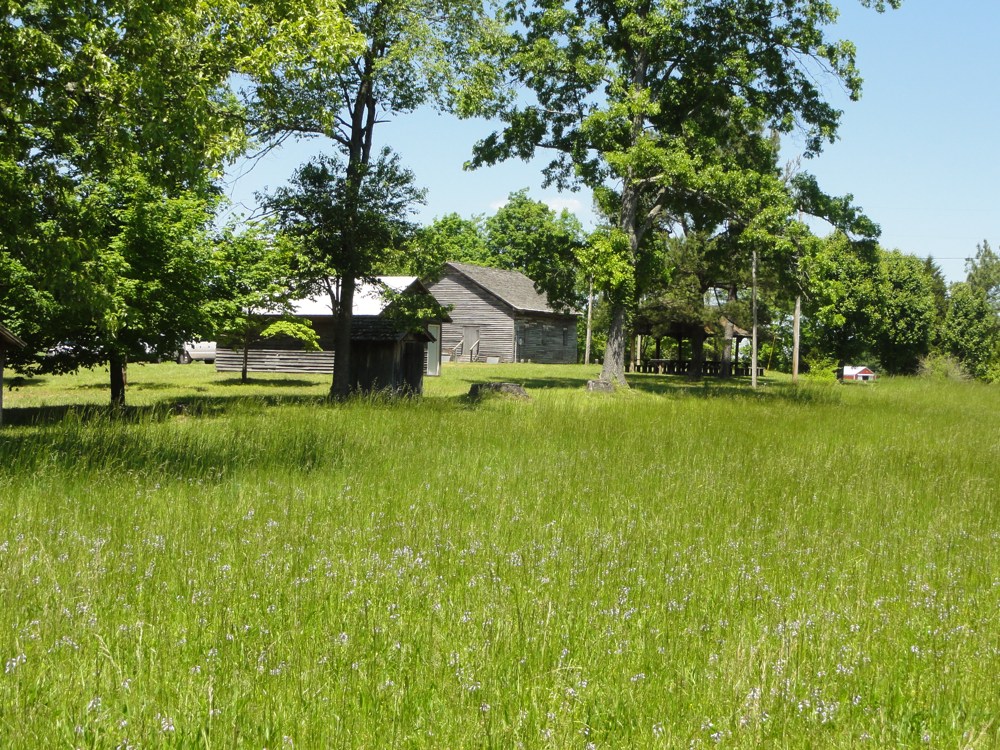
Old Philadelphia Meetinghouse From The Cemetery Entrance
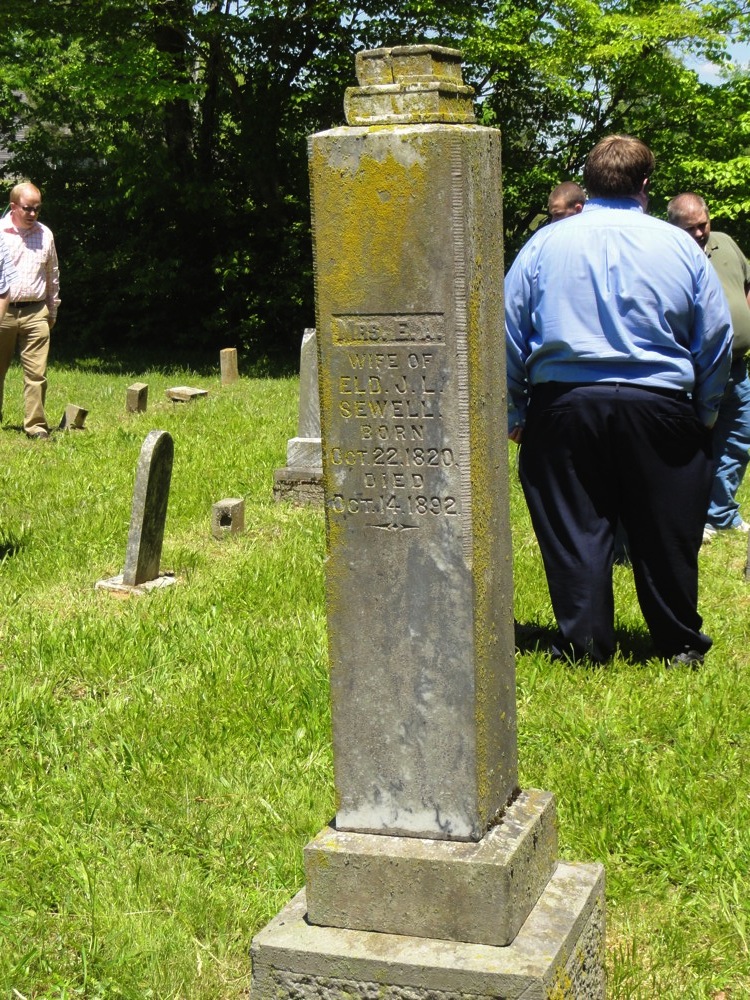
Mrs. E.A.
Wife Of
Eld. J.L.
Sewell
Born
October 22, 1820
Died
October 14, 1892
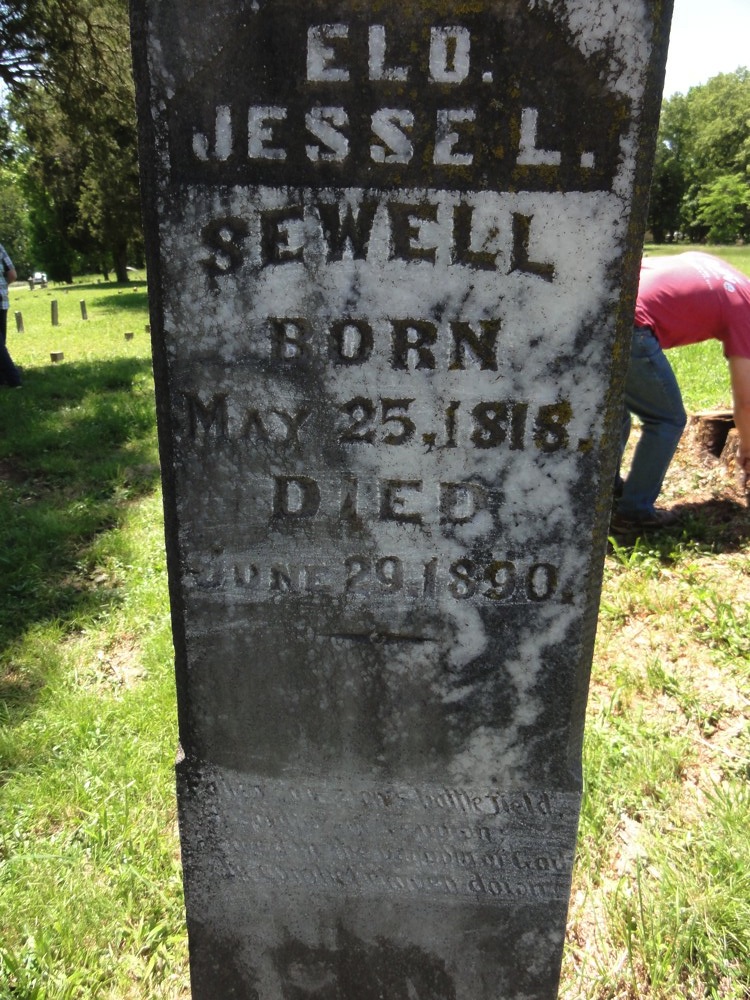
ELD
Jesse L.
Sewell
Born
May 25, 1818
Died
June 29, 1890
Fallen On Zion's Battle Field,
A Soldier Of Renown
Armed In The Panoply Of God,
In Conflict Cloven Down!
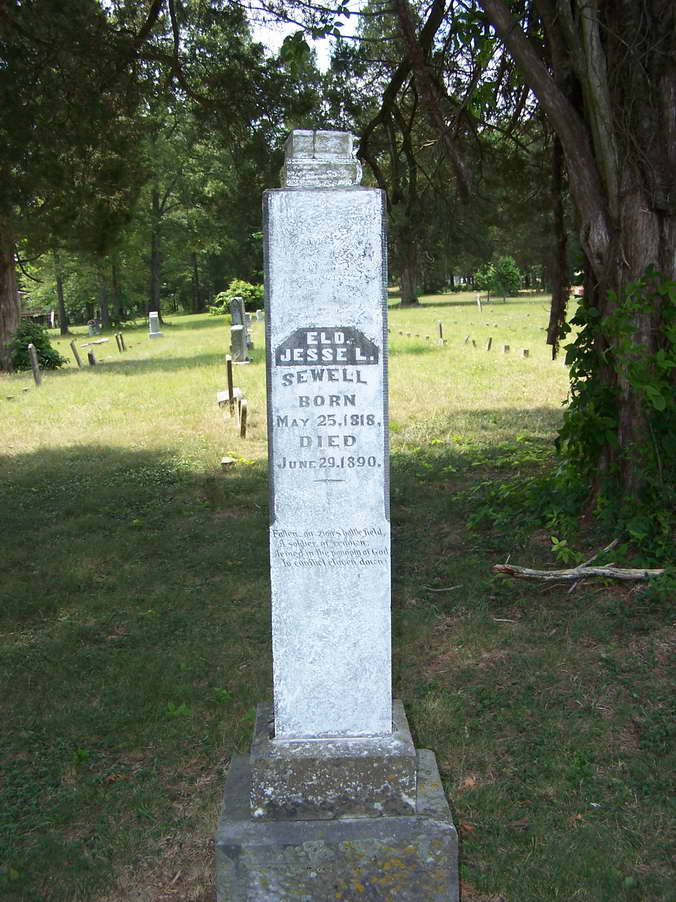
Picture Taken By Wayne Kilpatrick
